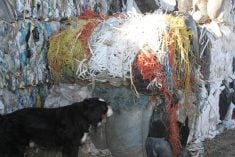The Big Sky Farms saga is nearing an end.
On Feb. 11 a Court of Queen’s Bench judge in Saskatoon approved the company’s plan to repay about $101 million to creditors.
The company, Saskatchewan’s largest hog producer, has agreed to pay $81 million to secured creditors, such as lending institutions, and $20 million to unsecured creditors, including farmers and small businesses owed money by Big Sky.
Creditors will be paid an average of 13 cents on the dollar.
The plan had a few days earlier been approved by 98.6 percent of creditors, representing 98.4 percent of the value of proven claims.
Read Also

Message to provincial agriculture ministers: focus on international trade
International trade stakeholders said securing markets in the face of increasing protectionism should be the key priority for Canada’s agriculture ministers.
The final step will come in the next 30 to 45 days, when the company is scheduled to turn over funds to Ernst and Young, which will then distribute the money to the creditors.
“Big Sky is pleased and very appreciative of the support of its creditors during this unprecedented and difficult time in its history,” said company president and chief executive officer Casey Smit.
He acknowledged that many of the company’s suppliers have experienced financial hardships, but said the plan approved by the court was the best outcome that could be achieved.
“We can finally see a bright light at the end of this long, dark tunnel,” said Smit.
Big Sky filed for protection under the Companies’ Creditors Arrangement Act on Nov. 10, 2009, after a number of circumstances combined to send the company into a financial tailspin.
That included rising feed costs, country-of-origin labelling on shipments to the United States, a rising Canadian dollar and the H1N1 virus, called swine flu by many.
Smit said many of those factors have improved and the company is well positioned for the future.
One key aspect of its restructuring plan is the development of eight limited partnerships under the Big Sky umbrella.
That will enable the company to make more use of the money available under the federal government’s Agri-Stability program and spread out the financial risk.














